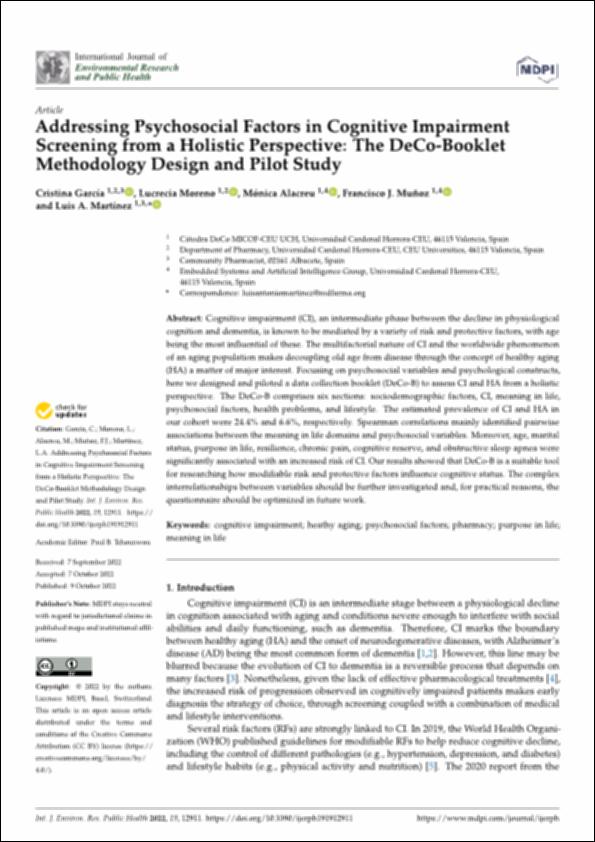Please use this identifier to cite or link to this item:
http://hdl.handle.net/10637/14025Addressing psychosocial factors in cognitive impairment screening from a holistic perspective : the DeCo-Booklet methodology design and pilot study
| Title: | Addressing psychosocial factors in cognitive impairment screening from a holistic perspective : the DeCo-Booklet methodology design and pilot study |
| Authors : | García García, Cristina Moreno Royo, Lucrecia Alacreu García, Mónica Muñoz Almaraz, Francisco Javier Martínez López, Luis Antonio |
| Keywords: | Alzheimer, Enfermedad de - Factores de riesgo.; Mentally ill older people - Risk factors.; Memory disorders - Risk factors.; Farmacia.; Memoria - Trastornos - Factores de riesgo.; Enfermedades mentales en los ancianos - Factores de riesgo.; Atención farmacéutica.; Pharmaceutical services.; Alzheimer's disease - Risk factors.; Pharmacy. |
| Publisher: | MDPI |
| Citation: | García, C., Moreno, L., Alacreu, M., Muñoz, F. J., & Martínez, L. A. (2022). Addressing psychosocial factors in cognitive impairment screening from a holistic perspective: the DeCo-Booklet methodology design and pilot study. International Journal of Environmental Research and Public Health, vol. 19, i. 19, art. 12911 (09 oct.). DOI: https://doi.org/10.3390/ijerph191912911 |
| Abstract: | Cognitive impairment (CI), an intermediate phase between the decline in physiological cognition and dementia, is known to be mediated by a variety of risk and protective factors, with age being the most influential of these. The multifactorial nature of CI and the worldwide phenomenon of an aging population makes decoupling old age from disease through the concept of healthy aging (HA) a matter of major interest. Focusing on psychosocial variables and psychological constructs, here we designed and piloted a data collection booklet (DeCo-B) to assess CI and HA from a holistic perspective. The DeCo-B comprises six sections: sociodemographic factors, CI, meaning in life, psychosocial factors, health problems, and lifestyle. The estimated prevalence of CI and HA in our cohort were 24.4% and 6.6%, respectively. Spearman correlations mainly identified pairwise associations between the meaning in life domains and psychosocial variables. Moreover, age, marital status, purpose in life, resilience, chronic pain, cognitive reserve, and obstructive sleep apnea were significantly associated with an increased risk of CI. Our results showed that DeCo-B is a suitable tool for researching how modifiable risk and protective factors influence cognitive status. The complex interrelationships between variables should be further investigated and, for practical reasons, the questionnaire should be optimized in future work. |
| Description: | Este artículo se encuentra disponible en la siguiente URL: https://www.mdpi.com/1660-4601/19/19/12911 |
| URI: | http://hdl.handle.net/10637/14025 |
| Rights : | http://creativecommons.org/licenses/by/4.0/deed.es |
| ISSN: | 1660-4601 (Electrónico) |
| Language: | es |
| Issue Date: | 9-Oct-2022 |
| Center : | Universidad Cardenal Herrera-CEU |
| Appears in Collections: | Dpto. Farmacia |
Items in DSpace are protected by copyright, with all rights reserved, unless otherwise indicated.


